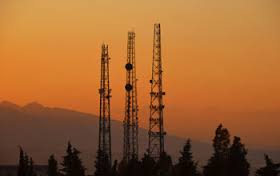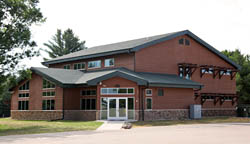News and Events
Use the filters below to narrow publications by offices, programs or categories
In an important step toward meeting President Obama’s goal of making 500 megahertz of spectrum available for mobile broadband by 2020, the Federal Communications Commission (FCC) today approved an innovative regulatory framework that will enable access to 100 megahertz of spectrum in the 3550-3650 MHz (3.5 GHz) band.
The Federal Government uses the 2900 - 3100 MHz band of spectrum for operating various types of radar systems that are used for safe and reliable maritime navigation and accurate weather monitoring.
Over the past five years through our national broadband grant program, NTIA has seen first-hand the economic and societal impact that broadband has on communities across the country. At the Broadband Communities conference in Austin, Texas this week, NTIA’s BroadbandUSA team will share our plans to leverage that expertise by providing communities with technical assistance and field-tested ideas. I will be speaking along with my NTIA colleagues Doug Kinkoph and Anne Neville.
This blog is cross posted on the U.S. Department of Commerce’s blog
At the U.S. Department of Commerce, we have witnessed first-hand the power of broadband to drive economic growth and innovation, open up new employment opportunities for Americans across the income spectrum and expand access to everything from education to healthcare to government services.
When NTIA launched the National Broadband Map in 2011, American consumers and businesses had few places to turn to when trying to determine who offered broadband in their communities. The National Broadband Map has not only filled that void but has helped detail the evolution of broadband in the United States as providers upgrade or expand their networks to meet the growing demand for faster broadband.
This post is part of our “Spotlight on NTIA” blog series, which is highlighting the work that NTIA employees are doing to advance NTIA’s mission of promoting broadband adoption, finding spectrum to meet the growing demand for wireless technologies, and ensuring the Internet remains an engine for innovation and economic growth.
Chris Hemmerlein says he feels fortunate to have a job that he enjoys so much. Hemmerlein, a telecommunications policy specialist in the Office of International Affairs, handles Asia- and United Nations-related issues for NTIA.
Last week, the Internet Corporation for Assigned Names and Numbers (ICANN) held its 52nd meeting in Singapore, where the global multistakeholder community continued progress on a proposal to transition the United States role related to the Internet Domain Name System.
The National Telecommunications and Information Administration’s BroadbandUSA team convened a productive workshop in Jackson, Miss., last week to explore ways to close the digital divide in a state that continues to expand broadband connectivity and adoption.
The event was the second in a series of regional workshops that NTIA is hosting across the country as part of its new BroadbandUSA program, which is helping communities improve local broadband capacity and utilization.
 The United States is fast becoming a wireless nation. The demand for wireless devices in all sectors of our lives – from smartphones to smart utility meters – is driving the exploding demand for access to spectrum. By 2019, Cisco predicts there will be a seven-fold increase in data traffic.
The United States is fast becoming a wireless nation. The demand for wireless devices in all sectors of our lives – from smartphones to smart utility meters – is driving the exploding demand for access to spectrum. By 2019, Cisco predicts there will be a seven-fold increase in data traffic.
By Lawrence E. Strickling, Assistant Secretary of Commerce for Communications and Information and NTIA administrator, and Alexander Macgillivray, U.S. Deputy Chief Technology Officer, White House Office of Science and Technology Policy
Today, I’m happy to recognize a number of NTIA employees who received Department of Commerce Gold and Silver awards for their outstanding contributions. Deputy Secretary of Commerce Bruce Andrews presented the awards at a special ceremony today.
Over the past five years, we at NTIA have seen first-hand through our broadband grant program the power of broadband to transform lives and impact communities. Broadband has become a cornerstone of economic growth, providing Americans the tools they need to participate in the rapidly growing digital economy.
In the summer of 2010 -- just three years after the introduction of the iPhone -- President Obama called on the National Telecommunications and Information Administration (NTIA) to collaborate with the Federal Communications Commission (FCC) to free up critical radio spectrum to fuel the breakneck growth of the wireless broadband market.
This post is part of our “Spotlight on NTIA” blog series, which is highlighting the work that NTIA employees are doing to advance NTIA’s mission of promoting broadband adoption, finding spectrum to meet the growing demand for wireless technologies, and ensuring the Internet remains an engine for innovation and economic growth.
When Congress called for the creation of a nationwide broadband network for public safety in the Middle Class Tax Relief and Job Creation Act of 2012, lawmakers knew it was important that states play a key role in ensuring that the network meets the needs of local first responders. To implement this goal, the law directed NTIA to establish the State and Local Implementation Grant Program (SLIGP) to support states as they prepare for the launch of the network.
This blog was cross posted on the Commerce.gov website.
One of the core functions of the National Telecommunications and Information Administration (NTIA) is to manage federal uses of wireless spectrum to make the most efficient use of this precious resource. It’s complex, technical work performed by a team of resourceful engineers who labor behind the scenes to ensure that federal agencies have the radio spectrum they need to perform all sorts of mission-critical functions.
This post is part of our “Spotlight on NTIA” blog series, which is highlighting the work that NTIA employees are doing to advance NTIA’s mission of promoting broadband adoption, finding spectrum to meet the growing demand for wireless technologies, and ensuring the Internet remains an engine for innovation and economic growth.
Agencies across the federal government use spectrum to perform critical functions from predicting the weather to air traffic control. But they may not be as familiar with NTIA’s role in this process and how we ensure agencies have the airwaves they need to carry out critical missions for the American people.
Today we are celebrating International Internet Day, which marks the first message ever sent over the Internet 45 years ago. At NTIA, one of our main jobs every day is to maximize the societal benefits made possible by the Internet through policies and efforts that expand Internet availability and adoption.
This post is part of our “Spotlight on NTIA” blog series, which is highlighting the work that NTIA employees are doing to advance NTIA’s mission of promoting broadband adoption, finding spectrum to meet the growing demand for wireless technologies, and ensuring the Internet remains an engine for innovation and economic growth.
You could say Lynn Chadwick’s career has come full circle.
The National Telecommunications and Information Administration (NTIA) last week hosted the second in a series of stakeholder workshops as we launch a new initiative to leverage the success of our Recovery Act broadband grant programs and support communities nationwide seeking to build their broadband capacity.
This post is part of our “Spotlight on NTIA” blog series, which is highlighting the work that NTIA employees are doing to advance NTIA’s mission of promoting broadband adoption, finding spectrum to meet the growing demand for wireless technologies, and ensuring the Internet remains an engine for innovation and economic growth.
Today, we are announcing the second in a series of workshops to share lessons we have learned from our broadband grants programs with communities nationwide seeking to build their broadband capacity.
“It’s been great seeing people come back and say, ‘I’ve been able to get a job,’ after we helped them with sprucing up their résumé and applying for jobs online.” - PCC Staff Member, Las Vegas Urban League
“Without this computer lab, we would not be getting people the jobs that we’re getting them. It’s just a great thing.” - Staff Member, Workforce West Virginia

